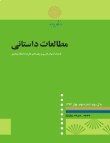narrative timing based on Gerard Genette theory in " I might have been lost"
Abstract:
A great number of contemporary Iranian novelists, significantly the women, have written their stories under the influence of contemporary Western writers. The reflection of their moods, pains, and limitations can be clearly seen in their story and novel collections. In this paper, the authors dealing with narrative techniques of Grard Genette on the one hand, and Sara Salar’s Ehtemalan Gom Shodeham (I May Have Been Lost) on the other hand, examine some of the most important of these techniques. Particularly, the technique of time in the narrative will be discussed. Genette presents his theory of the narrative time on the basis of order, continuity and frequency. Since the concept of narrative time is one of the significant components in Salar’s story, this technique will be investigated and confirmed in its statements. In addition, it is shown that the anachrony factor, especially in the analepsis type, is the most frequent one that makes the narrative time be slow.
Keywords:
Language:
Persian
Published:
مجله مطالعات داستانی, Volume:1 Issue: 2, 2013
Pages:
5 to 17
magiran.com/p1156020
دانلود و مطالعه متن این مقاله با یکی از روشهای زیر امکان پذیر است:
اشتراک شخصی
با عضویت و پرداخت آنلاین حق اشتراک یکساله به مبلغ 1,390,000ريال میتوانید 70 عنوان مطلب دانلود کنید!
اشتراک سازمانی
به کتابخانه دانشگاه یا محل کار خود پیشنهاد کنید تا اشتراک سازمانی این پایگاه را برای دسترسی نامحدود همه کاربران به متن مطالب تهیه نمایند!
توجه!
- حق عضویت دریافتی صرف حمایت از نشریات عضو و نگهداری، تکمیل و توسعه مگیران میشود.
- پرداخت حق اشتراک و دانلود مقالات اجازه بازنشر آن در سایر رسانههای چاپی و دیجیتال را به کاربر نمیدهد.
دسترسی سراسری کاربران دانشگاه پیام نور!
اعضای هیئت علمی و دانشجویان دانشگاه پیام نور در سراسر کشور، در صورت ثبت نام با ایمیل دانشگاهی، تا پایان فروردین ماه 1403 به مقالات سایت دسترسی خواهند داشت!
In order to view content subscription is required
Personal subscription
Subscribe magiran.com for 70 € euros via PayPal and download 70 articles during a year.
Organization subscription
Please contact us to subscribe your university or library for unlimited access!


